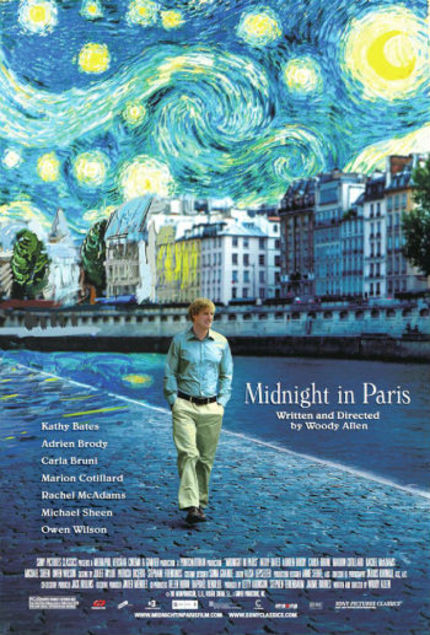MIDNIGHT IN PARIS Review

And, I should stop right there. As I was setting out to catch the screening of "Midnight in Paris", it occurred to me that it has actually been some time since I last saw a Woody Allen film when it was new. It sure didn't feel that way, as I've been keeping up the director vicariously, but the last one I saw in the theater was "Small Time Crooks", in 2000. Sheesh, that is a while ago.
In the meantime, Allen has, for better or for worse, continued to churn out movie after movie at his standard clip of one per year. Obviously, with a regiment like that, particularly at this point in ones career, we cannot expect every effort to be a masterpiece. And although it seems that for almost every new Allen film, there's at least a small contingent of critics who shrug and say, "well, it's the best he's done in the past decade", it occurs to me that "Midnight in Paris" must be different. Different in a good way. Naturally, with my dismal recent Allen track record, I cannot say for sure, not by a long shot. But I do know this - "Midnight in Paris" has a little bit of magic in it.
"Midnight in Paris" has been most compared to Allen's 1986 classic "The Purple Rose of Cairo", an apt comparison if not a perfect one. The melancholy comedic tone fused with the protagonist's longing to escape to a more lush, romantic time (and then doing so) are the greatest common bonds, although both films also stand close in terms of overall quality (the edge of course going to "Purple Rose", a perennial favorite of mine). Also, Allen himself does not appear in either film. (Consider that fact however you will.)
Unlike Mia Farrow's desired "Purple Rose" escapism from the Great Depression of 1930s America, this time, for Gil - Owen Wilson's frustrated-but-successful screenwriter of Hollywood schlock - his depression is now. And who can blame him, as his vacation in Paris is comprised of either being dragged from one high-end shop to the next by his steamroller of a fiancée (Rachel McAdams) and her staunchly conservative parents, or being condescended to in various museums and galleries by her insufferable know-it-all friends. Even as he finds himself in the most wonderful and romantic of cities, he is all the more pained by the fact that he's there in the wrong decade, with the wrong people. Paris in the 1920s. Now THAT was a time. Pablo Picasso, on the cusp on his painterly brilliance. Ernest Hemingway, hunting wild beasts and churning out prose of inner bravado. Gertrude Stein, at the hub of it all. And the surrealists - Dali, Bunuel, and Man Ray - striving valiantly to live life in the non sequitur. Right city, wrong time. If only...
And then it happens. One night as Gil is out for a midnight stroll, an extended vintage motor carriage comes by and picks him up. This is his magical ride to the Paris of yore, the Paris he's been pining for, the Paris he's been utterly romanticizing. All the luminaries are there. He takes this trip each night, developing relationships with them, and realizing their own human neuroses. Pablo Picasso, the uncertain lover. Ernest Hemingway, the unblinking blowhard. Gertrude Stein, enduring mother hen. And the surrealists - Dali, Bunuel, and Man Ray - striving ridiculously to live life in the non sequitur. This abrupt humanization of these icons of the art and literature is as amusing to Gil as it is to us. The electricity of the time is felt as he makes not just priceless connections and contacts, but friendships. The magic and charm of 1920s Paris is right out in front of everything, but at the same time, the imperfections begin to show, and not just the contrasts, but the comparisons to his present-time situation grow all the more evident.
Allen does a remarkable job of putting a fresh and fun spin on the well-worn time travel story device. One must bear in mind Allen's age, as the pacing and flow of the film veers into that fascinatingly tempered category of "old man cinema", a type of film that although it's in no hurry, does not have to lack spark or wisdom for years. Heck, Allen even has the audacity to begin his film with a five-minute travelogue pictorial of modern day Paris, in all its charm. Wilson, as one-note as his performances can be, here proves to be yet another quality Woody Allen surrogate protagonist - watchable, witty and yes, neurotic. For those even a little familiar with the luminaries met in vintage Paris, this will prove to be an engaging and rewarding trip.
Nostalgia for a past time is a theme not only of this film, but of the film career of Woody Allen (as many continue to pine away for his "older, funnier movies"). But of the several things that "Midnight in Paris" tells us, one big one is that for fans of its filmmaker, 2011 is a perfectly fine time to be in.
- Jim Tudor

Do you feel this content is inappropriate or infringes upon your rights? Click here to report it, or see our DMCA policy.






